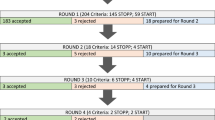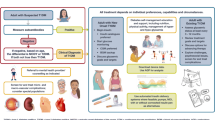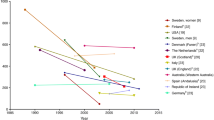Summary
Since 2003, structured treatment programs for chronically ill patients (disease management programs; DMPs) have been under development in Germany. Virtually nationwide, programs in which physicians and patients can register are being offered for diabetes mellitus types 1 and 2, breast cancer, coronary heart disease and asthma/COPD. The medical content of the programs is determined on the basis of evidence-based medicine.
Even though the effectiveness of structured treatment programs is documented for diabetes, adequate studies confirming the overall transferability of results to the German health care system are as yet lacking. Physicians above all strongly criticise the coupling of DMPs with the risk adjustment scheme of the statutory health insurance funds, as well as the large amount of paperwork involved.
Zusammenfassung
Seit 2003 werden in Deutschland strukturierte Versorgungsprogramme für chronisch Kranke entwickelt. Für Diabetes mellitus Typ 1 und Typ 2, Brustkrebs, koronare Herzkrankheit sowie Asthma/COPD besteht ein fast flächendeckendes Angebot, in das sich Ärzte und Patienten einschreiben können. Die medizinischen Inhalte werden auf der Basis von evidenzbasierten Leitlinien festgelegt. Obwohl die Wirksamkeit von DMP bei Diabetes gut belegt ist, fehlen bisher adäquate Studien, die die Übertragbarkeit auf Deutschland bestätigen. Von Ärzteseite wird v. A. die Verknüpfung mit dem Risikostrukturausgleich der Krankenkassen sowie der hohe Dokumentationsaufwand stark kritisiert.
Similar content being viewed by others
References
Faxon DP et al (2004) Improving Quality of Care Through Disease Management. Principles and Recommendations from the American Heart Association’s Expert Panel on Disease Management. Circulation 109:2651–2654
Fitzner K et al (2004) Principles for assessing disease management outcomes. Disease Management 7:191–201
GEK (2003) GEK-Gesundheitsreport 2003: Auswertungen der GEK-Gesundheitsberichterstattung. Schwerpunkt: Charakterisierung von Hochnutzern—präventive Potentiale? Schriftenreihe zur Gesundheitsanalyse, Band XXIV. Schwäbisch Gmünd 2003
Grol R, Grimshaw J (2003) From Best Evidence to Best Practice: Effective Implementation of Change in Patients’ Care. The Lancet 362:1225–1230
Häussler B, Berger U (2004) Bedingungen für effektive Disease-Management-Programme—Analyse, Bewertung und Lösungsansätze für Qualität und Finanzierung. Nomos, Baden-Baden
Hölzel D, Engel J, Schubert-Fritschle G (2004) Disease-Management-Programm Brustkrebs. Versorgungsrealität, Konzeptkritik und Perspektiven. D Ärztebl 101:A1810–A1819
Krüger-Brandt HE (2003) Disease Management: Ohne EDV keine Chance. Dtsch Ärztebl 100 A-2836:B-2361/C-2217
Lawrence P, Casalino MD (2005) Disease Management and the Organization of Physician Practice. JAMA 293:485–488
Linden A, Roberts N (2005) A user’s guide to the disease management literature: recommendations for reporting and assessing program outcomes. American Journal of Managed Care 11:113–120
Morfeld M, Koch U (2005) Ansprüche an die Evaluation komplexer Gesundheitsprogramme—Disease-Management-Programme in Deutschland. Z ärztliche Fortbildung und Qualitätssicherung im Gesundheitswesen 99:179–184
Nordrheinische Gemeinsame Einrichtung Disease-Management-Programme GbR (2004) Qualitätssicherungsbericht 2004. Disease-Management-Programme in Nordrhein. Düsseldorf. http://www.kvno.de/importiert/qualbe_dmp04.pdf (letzter Zugriff am 27. Juli 2005)
Raspe H, Sawicki P, Schmacke N (2004) Sind vorliegende Disease-Management-Programme für Diabetes wirklich unnötig? GGW 4:23–31
Sachverständigenrat für die Konzertierte Aktion im Gesundheitswesen (2002) Gutachten 2000/2001—Bedarfsgerechtigkeit und Wirtschaftlichkeit. Band III: Über-, Unter- und Fehlversorgung. Nomos, Baden-Baden
Schönbach K-H (2004) Disease-Management-Programme—ein Erfolg? Die BKK (11) S 483-486
Schulze J et al (2005) Rigides RSASMP Diabetes mellitus Typ 2: Bilanz einer 3-Länder-Umfrage. Z ärztliche Fortbildung Qualitätssicherung im Gesundheitswesen 99 (3):227–231
Seitz R (2004) Die deutschen DMP nach GMG und 9. RSAÄndV. Gesundheits-und Sozialpolitik 58:11–22
Van Lente J (2004) Disease Management. Für Kranke stark machen. Gesundheit und Gesellschaft 7:28–31
Wilson T, MacDowell M (2003) Framework for Assessing Causality in Disease Management Programmes. Principles. Disease Management 6:143–158
Wholey et al (2005) Physician use of disease management programs. Disease Management 8:26–34
Author information
Authors and Affiliations
Rights and permissions
About this article
Cite this article
Kirchner, H. Moderne Versorgungskonzepte—. ZS Kardiologie 94 (Suppl 4), iv7–iv11 (2005). https://doi.org/10.1007/s00392-005-1403-y
Issue Date:
DOI: https://doi.org/10.1007/s00392-005-1403-y




